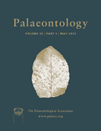
PALAEONTOLOGY
metrics 2024
Exploring Fossilized Legacies for a Deeper Tomorrow
Introduction
PALAEONTOLOGY, published by Wiley in the United Kingdom, is a leading journal dedicated to advancing the knowledge of Earth's biological history through the study of fossilized remains. With an ISSN of 0031-0239 and an E-ISSN of 1475-4983, this journal has established itself as a premier resource in the field, boasting a remarkable Q1 ranking in both Paleontology and Ecology, Evolution, Behavior and Systematics according to the 2023 category quartiles. Its commitment to high-quality research is evidenced by its Scopus rankings, placing it in the 93rd percentile among paleontology journals. While PALAEONTOLOGY is not currently open access, its extensive archival reach from 1979 to 2024 ensures that vital research findings remain accessible to the academic community. This journal not only acts as a platform for cutting-edge research but also fosters collaboration among scientists, students, and professionals interested in the implications of paleontological studies on contemporary ecological and evolutionary issues.
Metrics 2024
 1.09
1.09 2.50
2.50 2.80
2.80 74
74Metrics History
Rank 2024
Scopus
IF (Web Of Science)
JCI (Web Of Science)
Quartile History
Similar Journals

PALEONTOLOGICAL JOURNAL
Charting the Course of Evolutionary Change.The PALEONTOLOGICAL JOURNAL, published by PLEIADES PUBLISHING INC, is a premier platform for the dissemination of research in the field of paleontology. With an ISSN of 0031-0301 and E-ISSN 1555-6174, this journal serves the academic community by providing insights into fossil studies, evolutionary biology, and the historical narrative of life on Earth. Despite being categorized in the Q3 quartile for 2023 and currently holding a Scopus rank of #84 out of 113 in the Earth and Planetary Sciences- Paleontology category, it remains a valuable resource for researchers and practitioners. The journal's coverage spans from 1990 to 2024, offering a comprehensive historical perspective while also addressing contemporary issues in paleological research. Scholars and students alike benefit from its rigorous peer-reviewed articles and the opportunity to access vital knowledge in the ever-evolving field of paleontology.
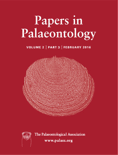
Papers in Palaeontology
Diving into the Diversity of Life Through TimePapers in Palaeontology, published by WILEY, is a premier academic journal dedicated to advancing the field of paleontology. With an admirable impact factor and positioned within the Q1 category in Paleontology for 2023, this journal has established itself as a leading platform for innovative research and discussion, ranking 17th out of 113 in Scopus’s Earth and Planetary Sciences category. Since its inception in 2015, Papers in Palaeontology has aimed to publish high-quality, peer-reviewed articles that explore the diversity of ancient life forms and their evolutionary history. Researchers, professionals, and students alike will find valuable insights and rigorous analyses that contribute to the understanding of our planet’s past. Although Open Access options are not available, the journal provides a wealth of knowledge essential for anyone engaged in the study or practice of paleontology, solidifying its importance in shaping future academic discourse.
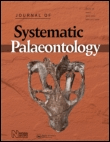
JOURNAL OF SYSTEMATIC PALAEONTOLOGY
Advancing the Frontiers of Palaeontological ResearchJOURNAL OF SYSTEMATIC PALAEONTOLOGY, published by Taylor & Francis Ltd in the United Kingdom, stands as a premier platform for advancing the discipline of palaeontology. With an ISSN of 1477-2019 and an E-ISSN of 1478-0941, this journal has achieved an impressive ranking of Q1 within its category for the 2023 Scopus metrics, underscoring its significance in the field. Currently ranked #10 out of 113 in Earth and Planetary Sciences – Paleontology with a remarkable 91st percentile, it serves as an essential resource for researchers, professionals, and students alike. The journal aims to publish cutting-edge research that fosters a deeper understanding of systematic palaeontology, including the evolutionary relationships and biodiversity of extinct organisms. While it operates under a traditional access model, the Journal’s expansive reach from its inception in 2003 through to 2024 ensures it continues to play a vital role in shaping the future of palaeontological studies.

PALAEONTOGRAPHICA ABTEILUNG A-PALAOZOOLOGIE-STRATIGRAPHIE
Decoding Earth's Layers: Your Resource for Pioneering ResearchPalaeontographica Abteilung A-Palaozoologie-Stratigraphie is a prominent academic journal that serves as a vital resource for researchers in the fields of Paleontology and Stratigraphy. Published by E Schweizerbart'sche Verlagsbuchhandlung in Germany, this journal has been instrumental in disseminating cutting-edge research from 1996 to 2024. With an established reputation highlighted by its Q3 ranking in both Paleontology and Stratigraphy, it ranks 26th among 113 journals in Paleontology and 15th among 55 in Stratigraphy, showcasing its significance within the scientific community. Although it does not currently offer open access, the journal provides an invaluable platform for the exchange of innovative ideas and findings in paleobiological and stratigraphic studies. As such, Palaeontographica continues to attract contributions from leading academics, making it an indispensable publication for professionals and students alike who are eager to advance their understanding of Earth's historical biological and geological patterns.

Palaeontographica Abteilung B-Palaeophytologie Palaeobotany-Palaeophytology
Exploring the Depths of Plant EvolutionPalaeontographica Abteilung B-Palaeophytologie Palaeobotany-Palaeophytology is a distinguished journal published by E SCHWEIZERBARTSCHE VERLAGSBUCHHANDLUNG in Germany, focusing on the intricate study of paleobotany, including the evolution and diversity of plant life throughout geological time. With an impressive Scopus ranking of #25 out of 113 in the field of paleontology, the journal is recognized for its contribution to advancing our understanding of ancient ecosystems, earning a prestigious Q2 quartile ranking in 2023. Despite its lack of open access options, the journal provides invaluable insights for researchers, professionals, and students alike who are passionate about exploring the fossil record and its implications for plant evolutionary history. The journal's collaborative nature and periodic publication schedule, ranging from 2005 to 2024, ensure that it remains at the forefront of paleontological research.

JOURNAL OF CONCHOLOGY
Illuminating the World of Shells and BeyondJOURNAL OF CONCHOLOGY, published by the Conchological Society of Great Britain & Ireland, is a prominent academic journal focused on the study of mollusks, specifically their taxonomy, ecology, and evolutionary biology. Through its rigorous peer-review process, it aims to provide a platform for significant research in the field, fostering deeper understanding and appreciation of these diverse organisms. Although it is not currently an Open Access journal, its publications contribute notably to the fields of Agricultural and Biological Sciences, notably in Ecology, Evolution, Behavior and Systematics and Aquatic Science, as indicated by its rankings in Scopus. The journal's archives trace comprehensive coverage from 1981 to 1990 and from 1996 to 2018. With its commitment to advancing conchological knowledge, the JOURNAL OF CONCHOLOGY serves as a crucial resource for researchers, professionals, and students invested in the biological and ecological dimensions of mollusk studies.

PalZ
Illuminating the Pathways of Biodiversity HistoryPalZ is a prestigious academic journal in the field of Paleontology, published by Springer Heidelberg in Germany. With a long-standing history that traces back to its converged years from 1914 to 2024, this journal offers invaluable insights into the evolutionary dynamics and ecological relationships of past life forms. Holding a commendable impact factor and ranked in the Q2 category of Paleontology, it consistently showcases high-quality research that resonates within the scientific community, evidenced by its Scopus rank of #38 out of 113 in Earth and Planetary Sciences. PalZ is committed to open access, ensuring that its rich repository of scholarly articles is readily accessible for researchers, professionals, and students alike. By engaging with the journal, readers will encounter cutting-edge studies that are pivotal for advancing our understanding of paleobiology and the historical patterns of biodiversity.
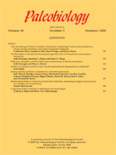
PALEOBIOLOGY
Pioneering Research in the Evolution of LifePALEOBIOLOGY, published by Cambridge University Press, is a premier, peer-reviewed journal that stands at the forefront of research in paleontological sciences. With a robust commitment to advancing the study of the interactions between ancient life forms and their environments, the journal has established itself as a vital resource for researchers, professionals, and students in the fields of paleontology, ecology, and evolutionary biology. Spanning from 1975 to 2024, it boasts an impressive Q1 ranking in several categories, including Agricultural and Biological Sciences, Ecology, and Paleontology, indicative of its high impact and relevance in shaping contemporary scientific discourse. While the journal is not open access, it offers a variety of subscription and access options, ensuring broad distribution and visibility of published research. As a leader in its discipline, PALEOBIOLOGY aims to facilitate a deeper understanding of our planet's biological history, making it an essential publication for anyone interested in the dynamics of life across geological time.
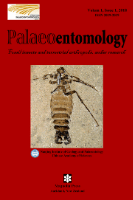
Palaeoentomology
Uncovering the Past: Insights into Ancient Insect LifePalaeoentomology is a leading journal dedicated to the study of fossil insects, fostering a deeper understanding of historical biodiversity and ecosystem dynamics. Published by MAGNOLIA PRESS, this journal provides an essential platform for researchers, educators, and students interested in entomological paleontology and related disciplines. Featuring a wide range of articles that explore fossil records, evolutionary patterns, and paleoenvironments, it serves the scientific community by enriching our understanding of the past. Although currently not open access, the journal prioritizes rigorous peer-review standards and aims to maintain a high impact factor, ensuring that published research meets the evolving demands of the field. Based in Auckland, New Zealand, it welcomes contributions from both established and emerging scientists worldwide, contributing to a vibrant discourse in the study of ancient insects and their ecological relationships.

Palaeobiodiversity and Palaeoenvironments
Illuminating the Intersections of Life and Landscape.Palaeobiodiversity and Palaeoenvironments, published by SPRINGER HEIDELBERG, is a distinguished academic journal that focuses on the intricate intersections of paleontology, ecology, and geology. With a strong commitment to advancing research in these fields, the journal maintains a notable impact factor and successfully ranks in the second quartile (Q2) in renowned categories including Ecology, Evolution, Behavior and Systematics, and Geology, providing significant visibility to contemporary research endeavors. Spanning a publication timeline from 2010 to 2024 and indexed under the respected Scopus database, it features a diverse array of articles that address the complexities of past biodiversity and ecosystems. Positioned within Germany's vibrant academic landscape, this journal appeals to a broad readership of researchers, professionals, and students who are eager to uncover the historical narratives of our planet’s life forms and their environments.